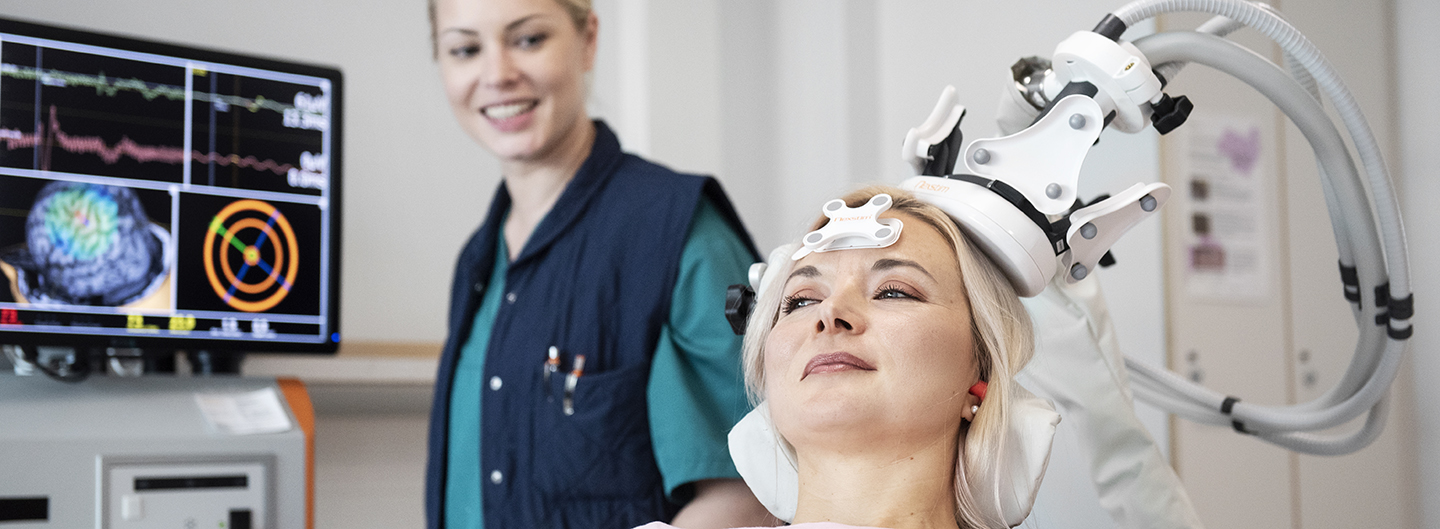In the specialised field of clinical neurophysiology, we provide repetitive TMS, that is, transcranial stimulation that is delivered as a sequence of magnetic pulses.

What is repetitive TMS?
During repetitive transcranial magnetic stimulation (repetitive TMS or rTMS), magnetic pulses are administered externally to the cerebral cortex. The procedure is non-invasive, painless and harmless. Magnetic pulses can be used to influence pain-regulating neural networks.
What problems can be treated with rTMS?
We administer rTMS to patients suffering from severe nerve pain if other methods of treatment have either been unsuitable or proved inadequate. Typically, patients will have severe facial nerve pain, phantom pain, or localised complex regional pain syndrome (CRPS), or be suffering from post-stroke pain.
Where is treatment provided?
HUS Helsinki University Hospital patients are treated in the Clinical Neurophysiology Unit at Meilahti Tower Hospital.
How do I get treatment?
You must have a referral for pain management from a specialist (for example, a neurologist), or you can seek treatment from a physician specialising in Helsinki University Hospital’s rTMS. Treatment requires an MRI scan of the head (see below for more information). Your referring physician or Helsinki University Hospital physician will give you a referral for this scan.
Care package
Treatment consists of the following stages:
-
Initial assessment of treatment needs
A neurologist and nurse specialising in Helsinki University Hospital’s rTMS will examine the patient at the appointment. If an MRI scan has yet to be performed, a physician will provide a referral for an MRI scan.
-
MRI scan of the head
The MRI can be performed at the HUS Medical Imaging Center, or the patient may obtain a referral to have an MRI performed at their desired research facility. As this is a specialised examination, there are certain quality criteria for imaging, and we will provide separate instructions on this. When the MRI is performed at the HUS Medical Imaging Center, no separate instructions are required and both the referral and results will be sent electronically.
An MRI of the head taken at an external research facility will be burned onto a CD, which the patient will then send to Helsinki University Hospital’s customer service along with the physician’s expert opinion. -
rTMS treatment
Treatment will typically be administered over a period of two weeks, for 15 minutes per day on weekdays, that is, a total of 10 sessions. During treatment, the patient will sit in a chair and a specialist nurse will administer the sequence of magnetic pulses. The intensity of the pulses will be adjusted to ensure that treatment is not painful. During the last session, a physician will assess the effectiveness of the treatment and decide whether the patient requires any further treatment.
-
rTMS further treatment
If required, care can continue for another 9 sessions of further treatment, which will begin immediately after the initial treatment period. Further treatment must be agreed on separately with the patient..
When can treatment not be administered?
Treatment is not suitable for patients who have metal in the head area (dental braces do not prevent treatment), a pacemaker, or an electrically powered pain management stimulator in the neck area. Treatment cannot be administered during pregnancy. Epilepsy is also a barrier to treatment.
Recovery
The patient can go home immediately after the treatment session.
Effectiveness of the treatment
The duration of the pain relief derived from rTMS treatment is individual and generally wears off gradually. Treatment will alleviate pain in about 30–50 per cent of patients suffering from nerve pain. Some patients may find that their pain intensifies, and treatment will then be stopped. A mild headache may occur during treatment, resulting from mild tension in the neck and shoulder muscles caused by sitting in one position.
How do I find out if this treatment is suitable for me?
Contact Orton’s customer service tel. +358 9 4748 2705
Customer Service sends you a questionnaire you need to fill out to describe your symptoms. After returning the questionnaire, Customer Service will help you further.

